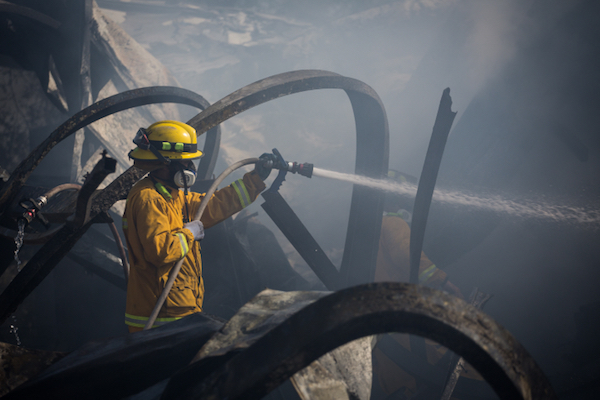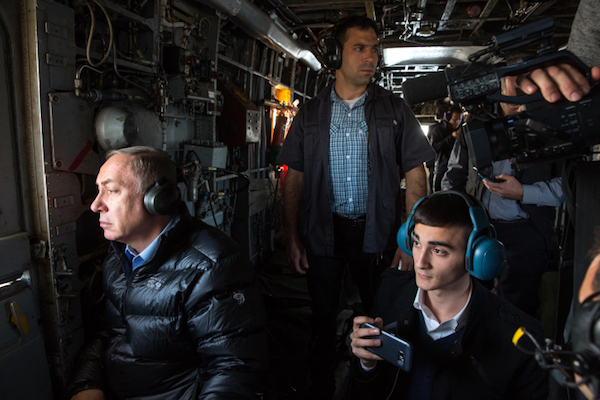Security officials and counter-terrorism experts warn against calling wildfires terrorism, but Israeli politicians and some media have no such qualms. How do you reach a conclusion before the investigation is even started?
By Yael Marom

As tens of thousands of people were forced to flee their homes, and as the flames were still burning across Israel and Palestine, Israeli leaders already found someone to blame, several Israeli news outlets declared the start of the “Arson Intifada,” and government ministers were lining up to describe the wave of fires as an act of Palestinian nationalistic violence.
The sight of flames devouring homes, neighborhoods and forests is devastating. It’s impossible not to feel for the tens of thousands of of people who have been forced to flee from their homes, and the thousands who have lost their worldly belongings. But it’s also impossible to not wonder how, as all of this is happening, Israel’s leaders seem so preoccupied with inciting against the Arab population.
To be clear, it’s entirely possible that not all of the dozens of fires in Israel and Palestine over the past few days broke out accidentally or naturally. It’s fire season — the combination of unusual dryness for this time of year and strong winds make wildfires a naturally occurring threat. And on top of that, Palestinian and Arab towns, cities and villages, have also been evacuated and hit by the fires — they’re not “targeting” Jews.
As Haggai Matar pointed out in Hebrew on Local Call, wildfires have been breaking out throughout the region over the past few days. A map from Global Forest Watch, a site that monitors wildfires via satellite imagery, seems to demonstrate that the fires are not limited to Israel. (See it here.)
“Though law enforcement has been loath to comment definitively [on the cause of the fires] before additionally evidence could be collected and processed,” the Times of Israel noted, ”politicians have had no such qualms.”
The wave of fires came just at the right moment for Israel’s prime minister. Somehow it always works out for him that way. There’s nothing like a fire to distract the public from a corruption scandal involving the purchase of unnecessary military submarines and the prime minister’s personal lawyer. Netanyahu knows that there’s nothing like an opportunity to blame it all on the Arabs, and that the media will eagerly play along.
And it didn’t take long for Netanyahu to get in front of the cameras and do just that. At a press conference with security forces and emergency responders, Netanyahu made sure to frame the alleged arson as terrorism and the accused arsonists as terrorists. “Every fire caused by arson, or by incitement to arson, is terrorism,” Netanyahu said. “Anyone who tries to burn parts of the State of Israel will be punished severely.”

Education Minister Naftali Bennett piled on with more anti-Palestinian statements: “Only he who the country doesn’t belong to him is capable of burning it.” Justice Minister Ayelet Shaked promised the strictest treatment for anyone caught setting fires. Culture Minister Miri Regev said: “We must catch the terrorists who who are burning our forests and endangering lives!”
Surely those politicians are not referring to the Israeli soldier who may have started one of the fires by tossing a lit cigarette.
Speaking to The Jerusalem Post, counter-terrorism expert Boaz Ganor warned that even if some of the fires are arson and politically motivated, it is not organized terrorism. “When we define this phenomenon as ‘fire intifada’ – words used by the media, politicians and laypeople – we are overestimating the phenomenon” and fueling actual would-be politically motivated arsonists.
Another expert, Michael Horowitz, told the Jerusalem Post: “It is too early to conclude that this is a ‘new form of terrorism,’ but it definitely can turn into that because of the virality of the trend… The mere perception of success can be enough to encourage copycat attacks.”
The eagerness to attribute the fires to Palestinian arson, combined with a regrettable celebration of the destruction in some corners of Arabic-language social media, appears to be behind one of the more particularly absurd episodes of recent days (although not the most bizarre). As Local Call blogger John Brown reported, police arrested a young Bedouin journalist from the southern Israeli city of Rahat on suspicion of incitement to commit arson on Thursday.
The Facebook post in question, however, published by Anas Abudaabes, was ironic, mocking Palestinians and other Arabs who ared celebrating the fires devastating their homeland. Abudaabes even gave his post “sarcasm” and “comedy” hashtags.
“It’s clear that the police didn’t bother to read the text all the way through, or they relied on Google Translate, and arrested him in order to hand [Public Security Minister Gilad Erdan] more fuel for his incitement,” wrote John Brown, a pseudonymn of an Israeli academic and blogger.
Abudaabes was scheduled to be brought before a judge for a remand hearing Friday afternoon.
It’s entirely unclear how most of the fires broke out, especially considering the high-risk fire weather at the moment. What is clear is that the Israeli Right and much of the Israeli media was all too eager to jump to quick and loose conclusions, many of which will probably turn out to be baseless. Instead of providing the public, Jews and Arabs alike, with ways to fight and cope with the fires, they are adding more fuel to them. The cause of the fires must be investigated, of course. But how can you say what the result is before the investigation is even started?
The 2010 Carmel Fire, which took 44 lives, displaced 17,000 people, and destroyed 12,000 acres, turned out to have been accidentally sparked by a 14-year-old smoking a hookah water pipe with friends.
Michael Schaeffer Omer-Man contributed to this article. A version of this post first appeared in Hebrew on Local Call. Read it here.
